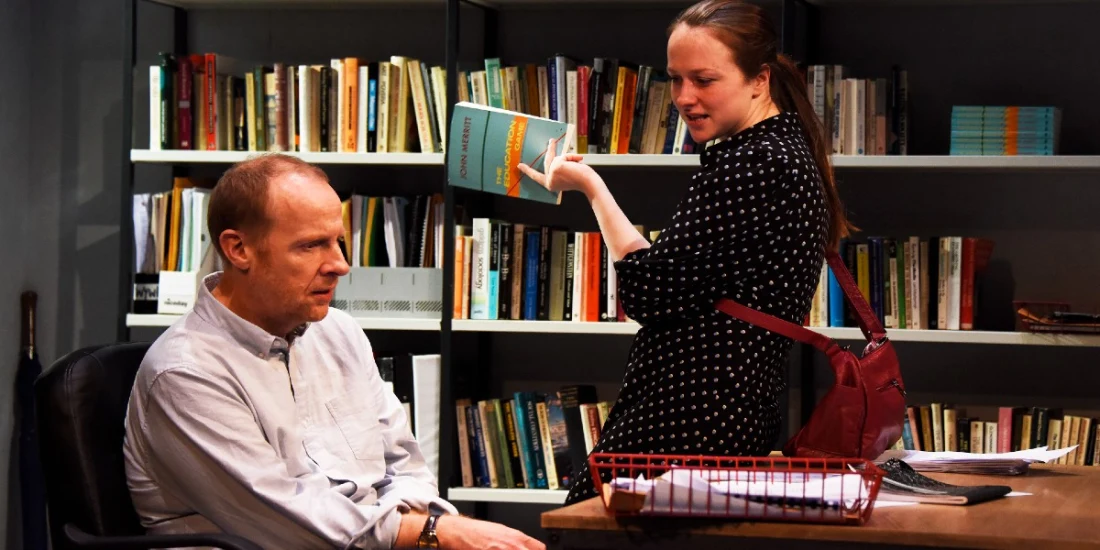Power politics in David Mamet's 'Oleanna' make for an imbalanced drama
It would be tempting to say that the time has come for Oleanna, David Mamet's supremely discomfiting play about power politics and academe that has been freshly revived by the director Lucy Bailey. But the sorrowful fact of the matter is that it's hard to imagine a world in which this ironically named play (its title references a folk song popularised in the 1960s that posits a possible utopia) doesn't chime with some sort of dystopian present.
Whether tallying with the gathering debate back in the day about political correctness or with the #MeToo movement and cancel culture that have arisen since, this smackdown between a professor and his student makes for every bit as uncomfortable an experience now as it did when I first saw it Off Broadway in 1992, and that is intended as a compliment. Less praiseworthy is an imbalance in the current performance that hands the play to Jonathan Slinger as the beleaguered professor, John. Once again, and not for the first time with Oleanna, the angry, increasingly agitated student Carol is left - comparatively speaking - out in the cold.
To some extent the imbalance feels inbuilt into the writing. How, for instance, can this militant-in-the-making arrive in John's office busily querying one word choice after another ("paradigm" brings her up short), only to let his use of "heterodoxy", for instance, pass without comment, even as she alights herself on such words as "impinge" and "discourteous"? As has always been true, Carol's struggle for clarity - her mantra, passed over to John by the end, is "I don't understand" - feels like a studied exercise in control from a student who has a highly developed awareness of status and class and knows just how to aim for the jugular. Her luck is to find a ready target in a faintly smug teacher whose home and career are seen by the end of 80 minutes to hang very much in the balance and whose office hours are interrupted by a ceaseless volley of phone calls - a device Mamet deployed to brilliant effect prior to this play in Glengarry Glen Ross.
I've seen this play now four or five times and continue not to envy whoever ends up playing Carol, given the role as written: Lia Williams at the Royal Court, under Harold Pinter's direction in 1993, did as best one could to find humanity in the heartless. The current Carol, Rosie Sheehy, looks somewhat like the role's originator, Rebecca Pidgeon, and has been directed presumably to adopt the same quasi-robotic delivery that would get under any listener's skin within minutes as indeed it does with John. (The actress, interestingly, was in the previous London run of the current West End play ANNA X.)
Unafraid to announce herself as "bad", she proves sociopathically resistant to John's appeal to empathy, instead taking refuge in reference to some unidentified "group" that has come up with a list of unacceptable books, John's latest tome amongst them. This particular aspect of the play has only gained in resonance over the years, and one doesn't have to look too far either side of the Atlantic to find students commandeering the syllabus at one university or another and the professor be damned. (The degree to which "accusations" are here seen to become "facts" chills the blood.)
Sheehy's metallic voice and wayward American accent do little to further Carol's case, which isn't helped by the challenge inbuilt in sharing a stage with Slinger, an RSC and West End veteran (he has played Hamlet as well as Willy Wonka) who remains quite simply one of the finest actors of his generation. More so than any John in my experience, Slinger tempers the role with a leavening softness that accentuates the plight of someone placed on a fast track toward destruction. "What are you, God?" Carol asks in the pair's climactic encounter, John's accuser by then as well-dressed as her woebegone victim is dishevelled. From there, it's not long before an especially ferocious closing sequence for which Philip D'Orleans' fight direction deserves all praise. It's scant surprise when language itself is seen ultimately to fall away, replaced by a merciless landscape of tearstained ruination and grief in which civility - even society itself - is as good as lost.
Oleanna is at the Arts Theatre to 23 October. Book Oleanna tickets on LondonTheatre.co.uk.
Photo credit: Oleanna (Photo by Nobby Clark)
Originally published on
